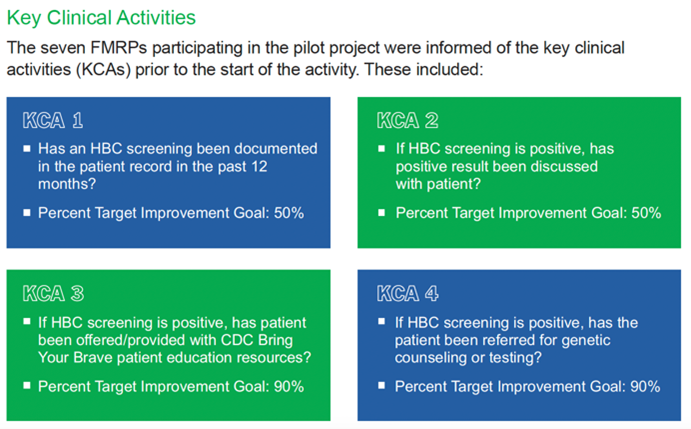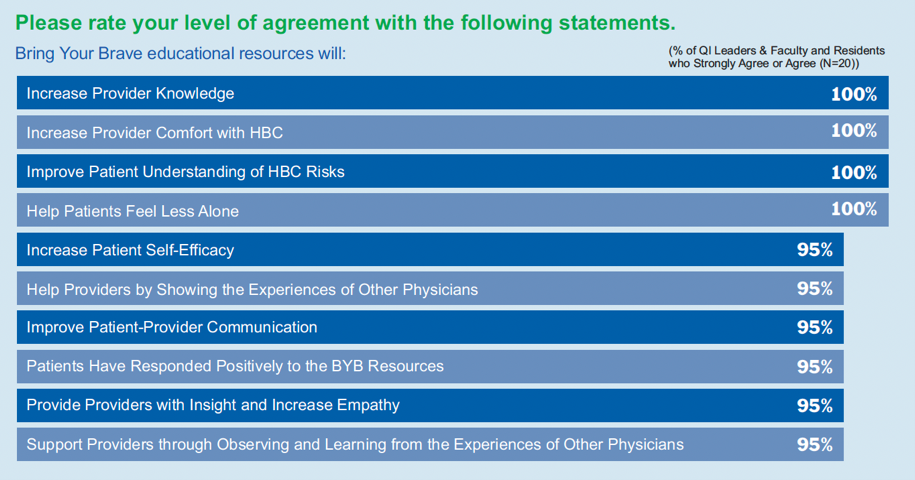In the fall of 2023, with funding from the CDC’s Helping Families Communicate about Hereditary Breast and Ovarian Cancer project, the National Association of Chronic Disease Directors (NACDD), in collaboration with the Family Medicine Education Consortium (FMEC), launched a Hereditary Breast Cancer (HBC) Quality Improvement (QI) Pilot Project. The purpose of the project is to engage family physicians to address HBC by using narrative medicine and incorporating educational resources from CDC’s Bring Your Brave campaign into practice. The Bring Your Brave campaign inspires young women to learn their risk for breast cancer, talk with their healthcare provider about their risk, and live a healthy lifestyle.
Seven primary care clinics participated in the QI pilot project, engaging in Plan Do Study Act cycles. The QI pilot project was organized into three areas:
- Identifying and implementing an HBC risk assessment questionnaire in practice (screening)
- Referring patients who screen positive for HBC for genetic counseling or testing
- Learning about and utilizing the CDC’s Bring Your Brave education resources with patients
The collaborative impacted approximately 211 physicians (158 residents, 53 faculty) and 52 other clinical staff. A subset of 48 family physicians and residents from these clinics with family medicine residency programs completed the project for 20 Prescribed Continuing Medical Education (CME) and 20 Performance Improvement credits (12 family physician faculty and 36 residents).
Participating clinics received several incentives, including iPads or tablets to share resources, access to QI coaches and stipends to share lessons learned at professional conferences and meetings.
Prior to launching the QI initiative in their clinics, physicians and residents were provided CME training on HBC screening, QI methodologies, and data collection. Ninety-three percent of participants reported that they were highly likely to integrate information they learned during the training into their practices.

The pilot was structured around key clinical activities (KCAs) focusing on screening, patient discussions, genetic counseling and testing referral, and educational outreach using the Bring Your Brave resources. To assess effectiveness of the QI initiative, clinics provided deidentified patient records for analysis: baseline, cycle 1, and cycle 2.
The results indicate that screening rates, discussions of the results with patients, sharing Bring Your Brave patient education resources, and referring patients who screened positive for genetic counseling or testing had greatly improved among the participating physicians. By the conclusion of the second QI cycle, 75% of the patients had been screened for HBC in comparison to 1% at baseline. Referrals for genetic counseling and testing increased dramatically (88%) from baseline (1%), reflecting a strengthened commitment to comprehensive patient care. There was also an increase in sharing Bring Your Brave resources with patients from 1% at baseline to 65% at the end of cycle 2.
At the conclusion of the pilot, 96% of the participants said that they intend to continue to assess patients for risk of HBC and 92% said that they will continue to offer the Bring Your Brave resources to patients who screen positive. All QI leaders expressed a high degree of satisfaction with the project and recommended this type of QI activity to their colleagues.
Moreover, the educational resources from the Bring Your Brave campaign were shown to have a positive impact on both patient and provider outcomes. Physicians reported that resources help increase provider knowledge about and comfort with HBC, improve patient understanding of HBC risk, help patients feel less alone and increase patient self-efficacy.
The pilot’s success also underscored the value of educational resources in improving patient-provider communication. Many participants expressed that the storytelling elements of the Bring Your Brave campaign fostered a more empathetic approach to patient care, helping them understand patients’ emotional and familial contexts. This insight was essential in enhancing the physicians’ ability to convey difficult information compassionately and effectively.

The results suggest that utilizing educational resources of the Bring Your Brave campaign could not only aid in clinical discussions but also strengthen the bond between patients and providers, leading to more positive healthcare experiences and outcomes.
